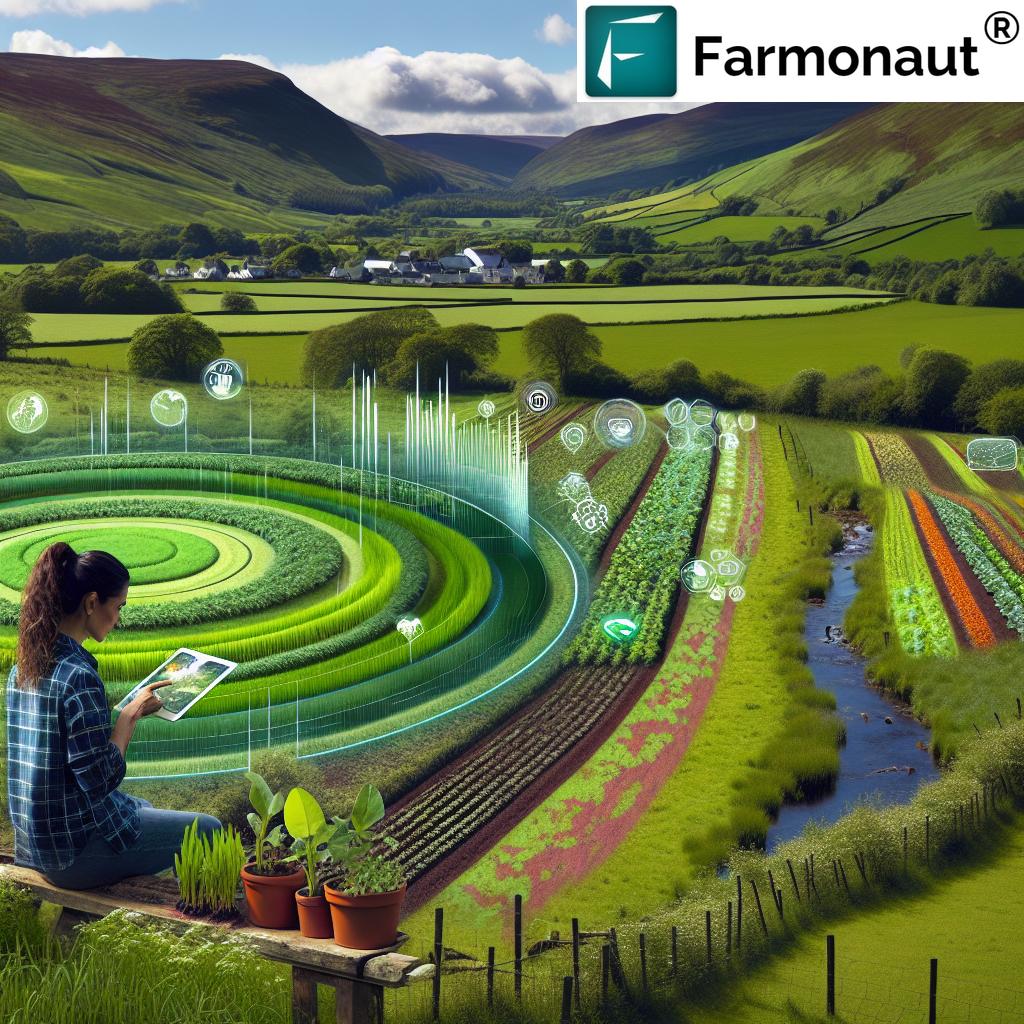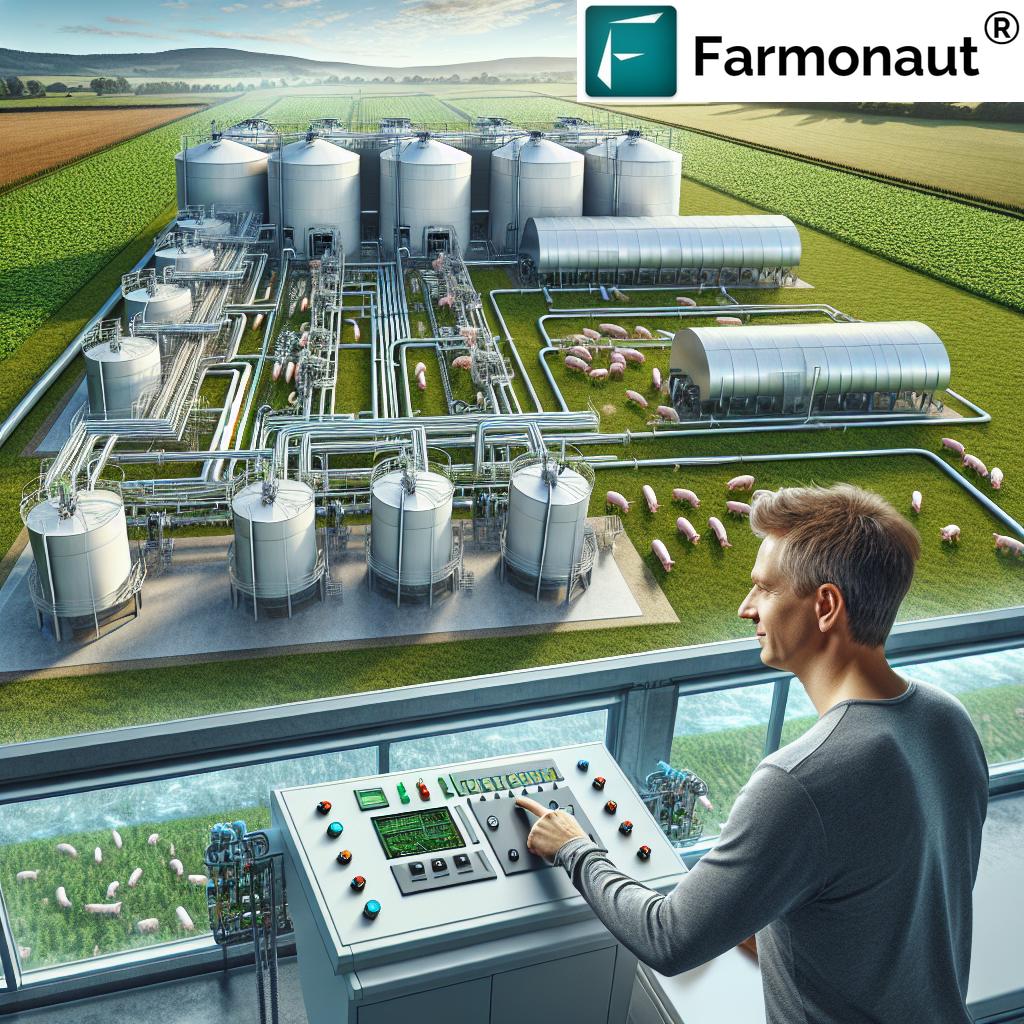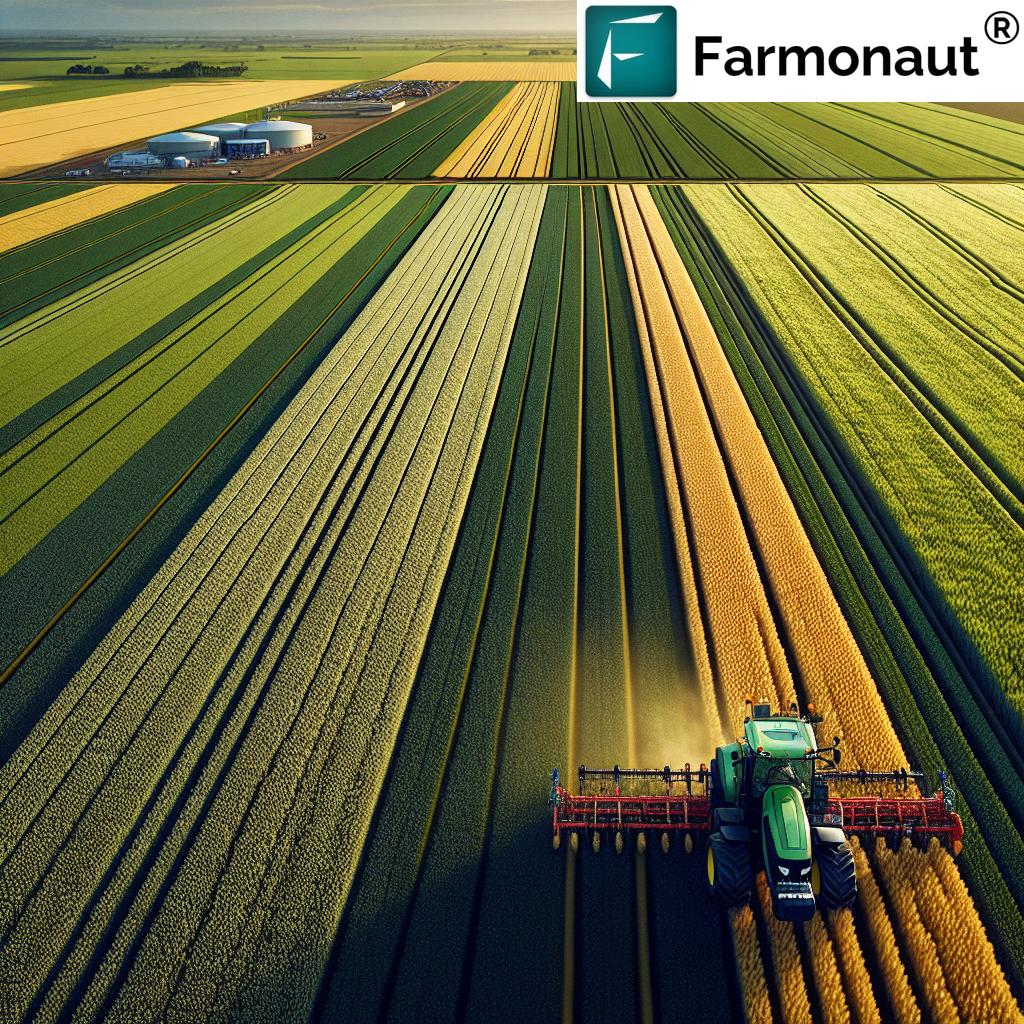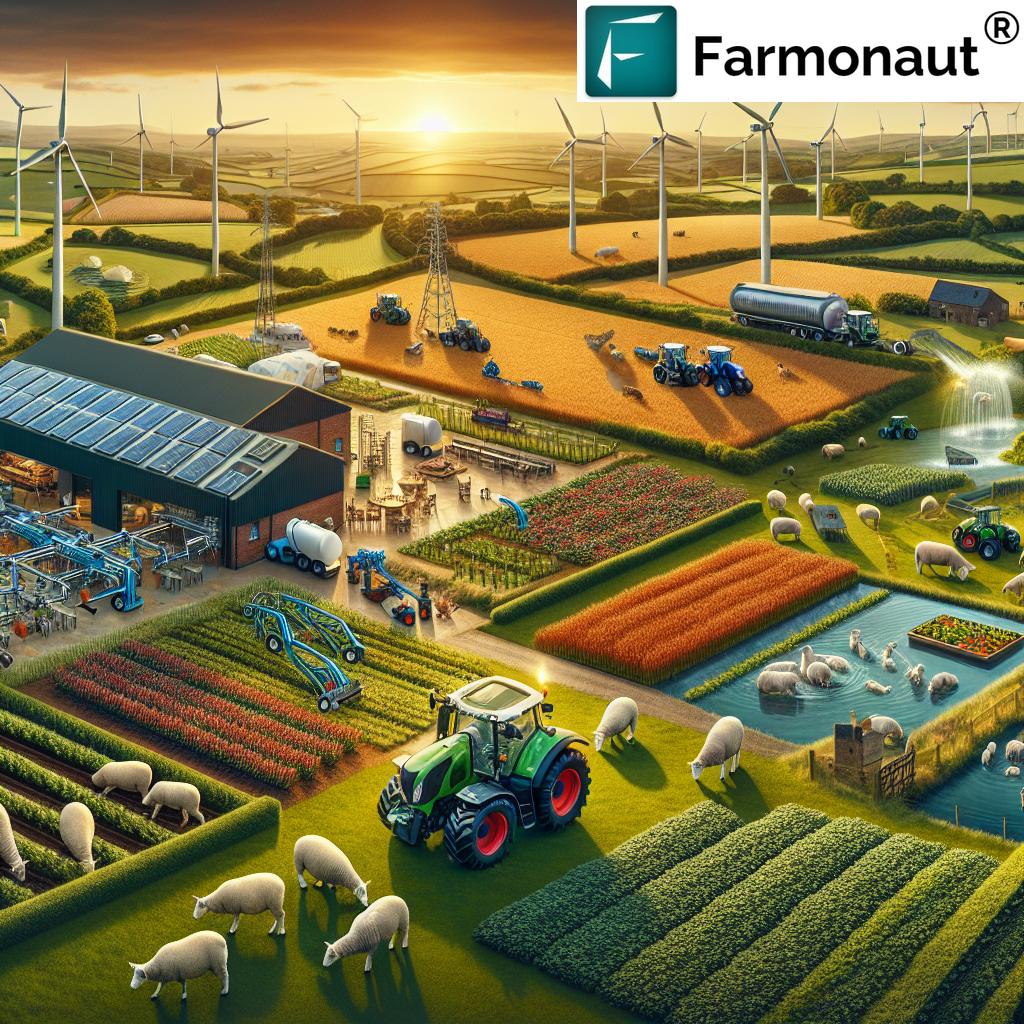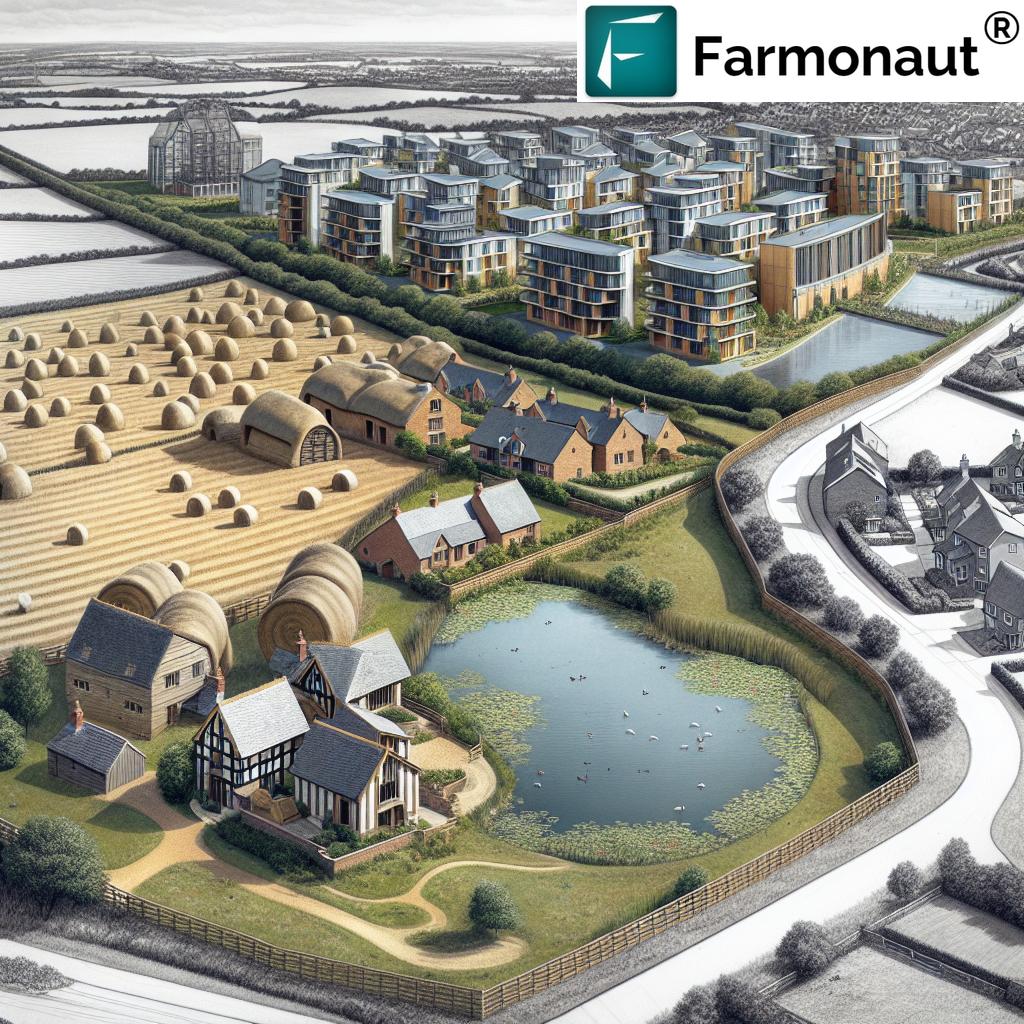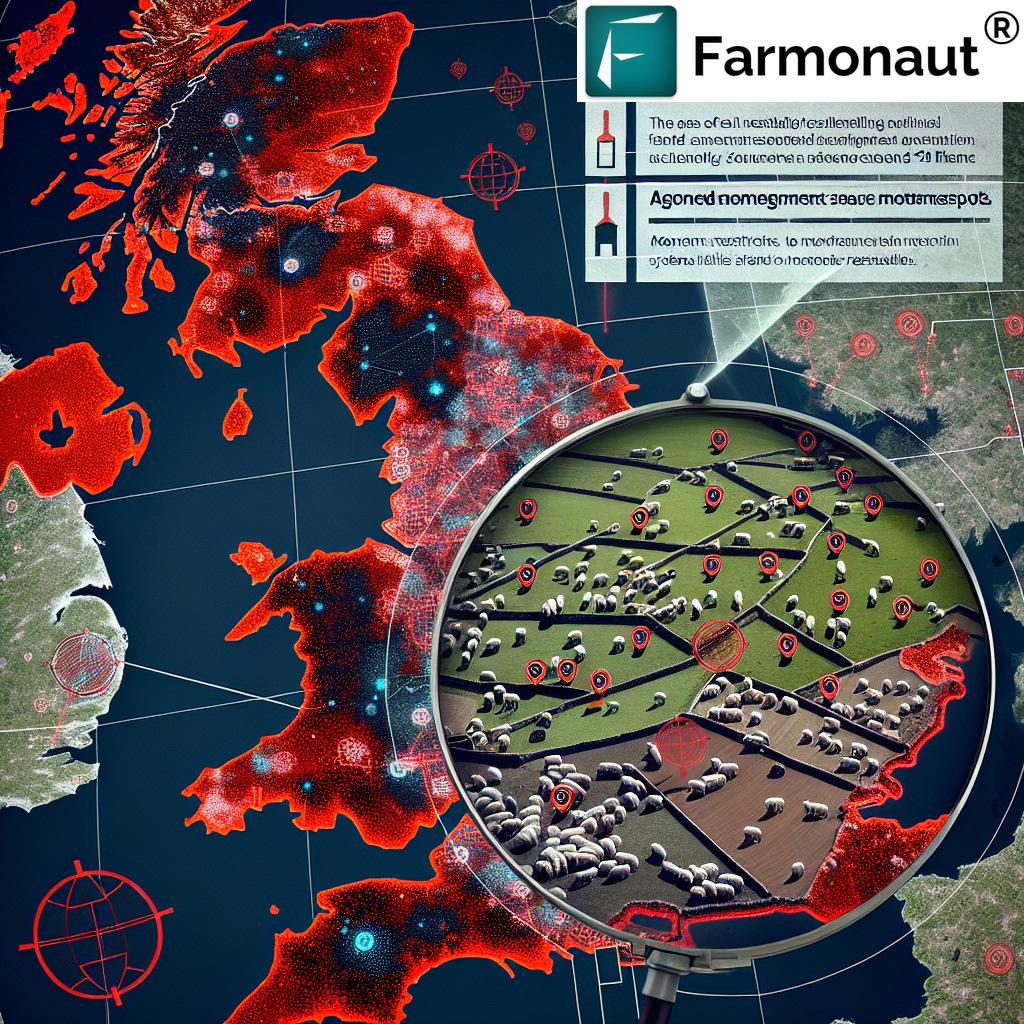Revolutionizing UK Agriculture: Farmonaut’s Guide to Sustainable Farming Practices Amidst Crisis
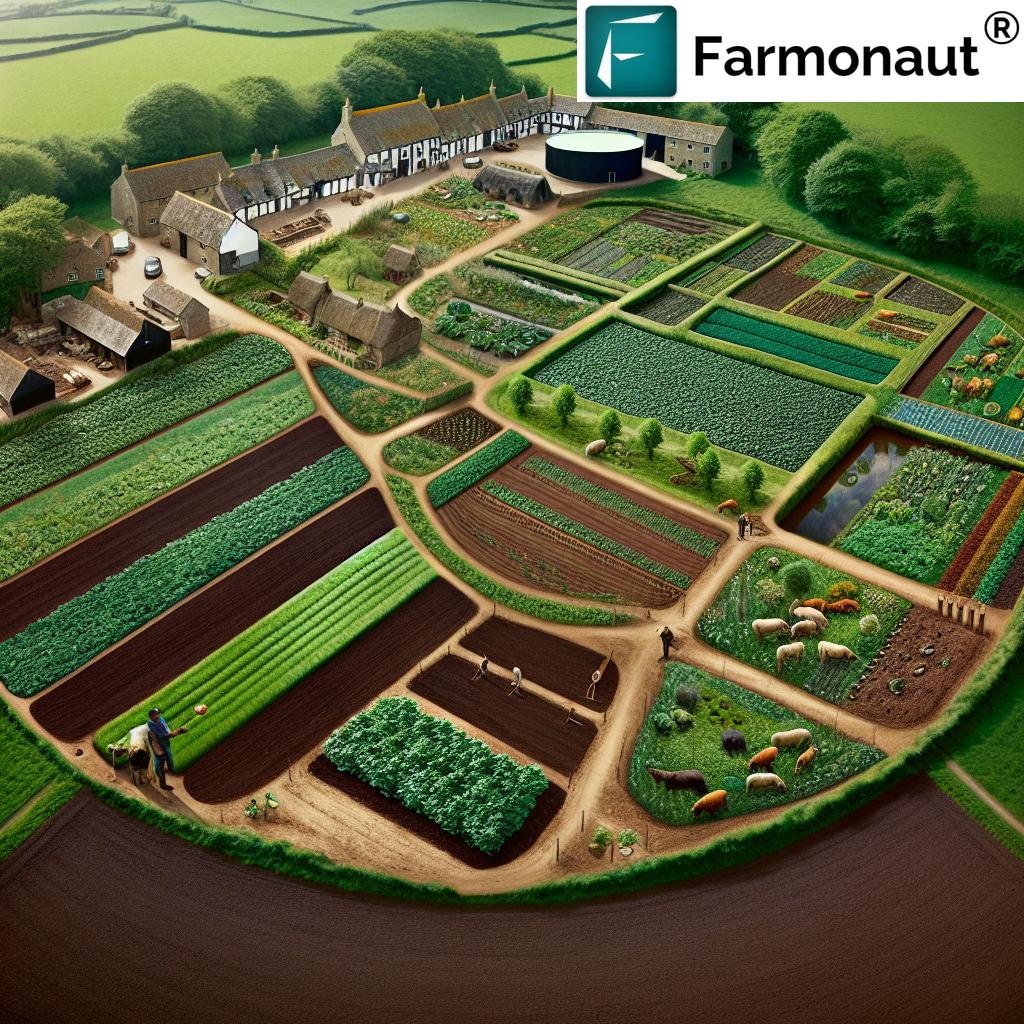
“UK farmers face a dual challenge: 40% of arable soils are degraded, while also needing to increase food production by 70% by 2050.”
In the face of a looming agricultural crisis, we find ourselves at a critical juncture in British farming. The UK agriculture industry is grappling with unprecedented challenges, from soil degradation to declining biodiversity, all while striving to meet the ever-growing demand for food production. As we navigate these turbulent waters, it’s clear that a revolution in farming practices is not just desirable – it’s essential.
In this comprehensive guide, we’ll explore the intricate landscape of sustainable farming practices and how they can address the UK agriculture crisis. We’ll delve into the challenges British farmers face, the innovative solutions emerging in sustainable food production, and how companies like Farmonaut are leveraging technology to support this crucial transition.
The Current State of UK Agriculture: A Crisis Unfolding
The British farming industry stands at a crossroads. On one side, we have a rich agricultural heritage and a population that relies on our farmers for sustenance. On the other, we face a stark reality: our current farming methods are often unsustainable, leading to a host of environmental and economic issues.
- Soil Degradation: Nearly 40% of UK arable soils are classified as degraded, threatening long-term productivity.
- Biodiversity Loss: Intensive farming practices have led to a significant decline in wildlife populations.
- Economic Pressure: Many farmers struggle to make a living, caught between rising costs and price pressures.
- Climate Change: Extreme weather events are becoming more frequent, impacting crop yields and livestock health.
These challenges paint a grim picture, but they also present an opportunity for transformation. The crisis in UK agriculture is a call to action – a chance to revolutionize how we approach farming and food production.
Sustainable Farming: A Path Forward
Sustainable farming practices offer a beacon of hope in this challenging landscape. By adopting methods that work in harmony with nature rather than against it, we can address many of the issues plaguing UK agriculture. Let’s explore some key sustainable practices and their benefits:
| Farming Aspect | Traditional Method | Sustainable Practice | Benefits of Sustainable Approach |
|---|---|---|---|
| Soil Management | Intensive Tilling | Conservation Tillage | Improved soil health, reduced erosion (up to 90% reduction) |
| Water Usage | Flood Irrigation | Precision Irrigation | Water savings up to 30%, reduced runoff |
| Pest Control | Chemical Pesticides | Integrated Pest Management | Reduced chemical use, increased biodiversity |
| Crop Diversity | Monoculture | Crop Rotation and Intercropping | Improved soil fertility, natural pest control |
| Livestock Management | Intensive Confinement | Rotational Grazing | Better animal welfare, improved pasture health |
Implementing these sustainable practices can lead to significant improvements in both environmental health and farm profitability. However, the transition is not without its challenges.
The Challenges of Transitioning to Sustainable Agriculture
While the benefits of sustainable farming are clear, many British farmers face significant hurdles in making the transition:
- Financial Constraints: Sustainable practices often require upfront investments in new equipment or technologies.
- Knowledge Gap: Farmers may lack the expertise needed to implement new sustainable methods effectively.
- Market Pressures: The demand for cheap food can make it difficult for farmers to justify higher production costs.
- Policy Barriers: Some agricultural policies may inadvertently discourage sustainable practices.
Addressing these challenges requires a multi-faceted approach, involving support from government, industry, and consumers alike.
The Role of Technology in Sustainable Farming
In the quest for sustainable agriculture, technology emerges as a powerful ally. Innovations in agritech are making it easier and more affordable for farmers to adopt sustainable practices while improving productivity and profitability.
“Satellite-based crop monitoring can reduce water usage in agriculture by up to 30% and increase crop yields by 15%.”
One such innovation comes from Farmonaut, a company at the forefront of agricultural technology. Farmonaut offers advanced, satellite-based farm management solutions that are accessible via Android, iOS, web/browser apps, and API. Their mission aligns perfectly with the goals of sustainable agriculture: to make precision farming affordable and accessible to farmers worldwide.
Farmonaut’s Sustainable Farming Solutions
- Satellite-Based Crop Health Monitoring: By leveraging multispectral satellite imagery, Farmonaut provides farmers with real-time insights into crop health, soil moisture levels, and other critical metrics. This data-driven approach allows for more precise resource management, reducing waste and environmental impact.
- AI-Powered Advisory System: Farmonaut’s Jeevn AI system delivers personalized farm advice, weather forecasts, and crop management strategies. This helps farmers make informed decisions that optimize yield while minimizing resource use.
- Blockchain-Based Traceability: For those concerned with supply chain transparency, Farmonaut’s blockchain solutions ensure that every step of the food production process is traceable and verifiable.
- Carbon Footprint Tracking: As sustainability becomes increasingly important, Farmonaut offers tools to monitor and reduce carbon emissions in agricultural operations.
These technologies not only support sustainable farming practices but also help improve farmer profitability in the UK by optimizing resource use and reducing waste.
To learn more about how Farmonaut’s solutions can benefit your farm, visit their web app or download their mobile apps:
The Economics of Sustainable Farming
One of the most pressing concerns for British farmers considering the transition to sustainable practices is the economic viability of such a move. While there are undoubtedly upfront costs associated with adopting new methods and technologies, the long-term economic benefits can be substantial:
- Reduced Input Costs: Sustainable practices often lead to lower expenses for fertilizers, pesticides, and water.
- Improved Soil Health: Healthier soils can lead to better yields and more resilient crops, potentially increasing profits over time.
- Premium Pricing: Consumers are increasingly willing to pay more for sustainably produced food, opening up new market opportunities.
- Diversified Income Streams: Sustainable farms often benefit from multiple revenue sources, such as agritourism or carbon credits.
However, the transition period can be financially challenging for many farmers. This is where agricultural funding support becomes crucial.
Funding and Support for Sustainable Agriculture
Various initiatives are emerging to support farmers in their transition to sustainable practices:
- Government Grants: The UK government offers several schemes to support sustainable farming initiatives, such as the Environmental Land Management scheme.
- Private Sector Investment: Banks and investment firms are increasingly recognizing the value of sustainable agriculture, offering specialized loans and financial products.
- Collaborative Models: Farmer cooperatives and community-supported agriculture models can help share the costs and risks of transition.
- Technology Partnerships: Companies like Farmonaut offer affordable access to advanced farming technologies, making the transition more manageable.
For those interested in exploring funding opportunities, Farmonaut’s affiliate program offers a unique way to earn while promoting sustainable farming practices:
Earn With Farmonaut: Earn 20% recurring commission with Farmonaut’s affiliate program by sharing your promo code and helping farmers save 10%. Onboard 10 Elite farmers monthly to earn a minimum of $148,000 annually—start now and grow your income!
Preserving Biodiversity in British Farming
One of the most critical aspects of sustainable agriculture is the preservation and enhancement of biodiversity. The UK’s rich tapestry of flora and fauna has been significantly impacted by intensive farming practices over the years. Restoring and protecting this biodiversity is not just an environmental imperative but also a key to long-term agricultural resilience.
Strategies for Enhancing Farming Biodiversity
- Hedgerow Restoration: Planting and maintaining hedgerows provides habitats for wildlife and helps prevent soil erosion.
- Wildflower Margins: Creating strips of wildflowers along field edges supports pollinators and beneficial insects.
- Agroforestry: Integrating trees into farming systems can improve soil health and provide habitats for various species.
- Reduced Pesticide Use: Adopting integrated pest management techniques helps protect beneficial insects and wildlife.
By implementing these strategies, farmers can create a more balanced ecosystem on their land, which in turn supports sustainable crop production and livestock management.
Soil Health: The Foundation of Sustainable Agriculture
At the heart of sustainable farming lies the health of our soils. Healthy soils are not only more productive but also more resilient to climate change and better at sequestering carbon. However, with 40% of UK arable soils classified as degraded, there’s an urgent need for action.
Techniques for Improving Soil Health
- Cover Cropping: Planting cover crops between main crop seasons helps prevent erosion, improve soil structure, and add organic matter.
- Reduced Tillage: Minimizing soil disturbance helps preserve soil structure and beneficial microorganisms.
- Crop Rotation: Alternating crops helps break pest cycles and balances nutrient demands on the soil.
- Organic Matter Management: Incorporating compost and crop residues enhances soil fertility and water retention.
Farmonaut’s satellite-based monitoring can play a crucial role in soil health management by providing detailed insights into soil moisture levels and vegetation health. This data allows farmers to make informed decisions about irrigation, fertilization, and crop rotation strategies.
For developers interested in integrating these technologies into their own solutions, Farmonaut offers an API with comprehensive documentation.
The Consumer’s Role in Sustainable Agriculture
While much of the focus on sustainable farming is rightly placed on producers, consumers play a crucial role in driving this transition. As we strive to balance the need for affordable food with the imperative of sustainable production, consumer awareness and choices become increasingly important.
How Consumers Can Support Sustainable Farming
- Choose Sustainable Products: Look for certifications that indicate sustainable farming practices.
- Support Local Farmers: Buying from local, sustainable farms helps reduce food miles and supports the local economy.
- Reduce Food Waste: By wasting less food, we can reduce the pressure on farmers to overproduce.
- Educate Yourself: Understanding the true cost of food production can help consumers make more informed choices.
By making conscious choices, consumers can create demand for sustainably produced food, encouraging more farmers to adopt these practices.
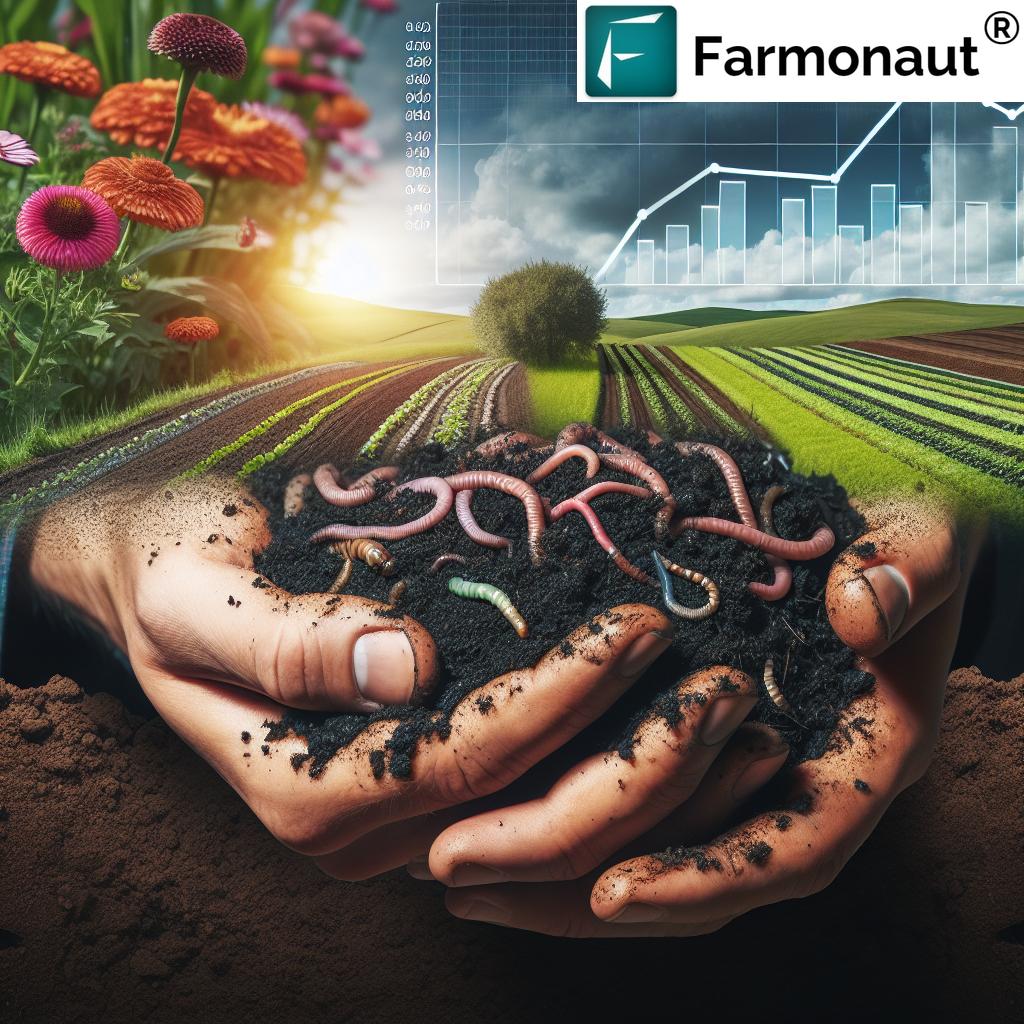
The Future of British Agriculture
As we look to the future of UK agriculture, it’s clear that sustainability must be at its core. The challenges are significant, but so are the opportunities. By embracing sustainable farming practices, leveraging innovative technologies, and fostering a supportive ecosystem, we can create a resilient and thriving agricultural sector that meets the needs of both people and planet.
Key Areas for Future Development
- Precision Agriculture: Further integration of technologies like those offered by Farmonaut to optimize resource use and reduce environmental impact.
- Regenerative Farming: Moving beyond sustainability to actively restore ecosystems and improve soil health.
- Climate-Smart Agriculture: Developing farming systems that are resilient to climate change while minimizing greenhouse gas emissions.
- Urban and Vertical Farming: Exploring new ways to produce food in urban environments to reduce pressure on rural land.
Conclusion: A Call to Action
The transition to sustainable agriculture in the UK is not just a necessity; it’s an opportunity to revolutionize our food system for the better. By adopting sustainable farming practices, leveraging innovative technologies like those offered by Farmonaut, and fostering a supportive ecosystem that includes farmers, consumers, and policymakers, we can address the current crisis and build a resilient, profitable, and environmentally friendly agricultural sector.
As we’ve explored throughout this guide, the challenges are significant, but so are the potential rewards. From improved soil health and increased biodiversity to enhanced profitability and food security, the benefits of sustainable agriculture extend far beyond the farm gate.
We invite all stakeholders in the UK food system – farmers, consumers, policymakers, and technology providers – to join in this crucial transition. Together, we can create a future where British agriculture not only feeds the nation but also nurtures our environment and supports thriving rural communities.
To learn more about how you can be part of this agricultural revolution, explore Farmonaut’s solutions:
FAQs
- What is sustainable agriculture?
Sustainable agriculture refers to farming practices that meet society’s food needs in the present without compromising the ability of future generations to meet their own needs. It involves methods that protect the environment, public health, human communities, and animal welfare. - How can technology help in sustainable farming?
Technologies like satellite-based crop monitoring, AI-driven advisory systems, and precision agriculture tools can help farmers optimize resource use, reduce waste, and make more informed decisions about crop management. - What are the main challenges facing UK farmers in transitioning to sustainable practices?
The main challenges include financial constraints, knowledge gaps, market pressures for cheap food, and sometimes conflicting agricultural policies. - How can consumers support sustainable farming?
Consumers can support sustainable farming by choosing sustainably produced foods, reducing food waste, supporting local farmers, and educating themselves about food production. - What role does soil health play in sustainable agriculture?
Soil health is fundamental to sustainable agriculture. Healthy soils are more productive, resilient to climate change, and better at sequestering carbon, contributing to both food security and environmental sustainability.







